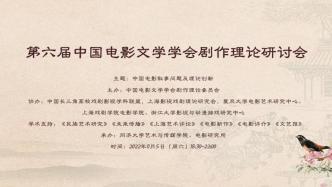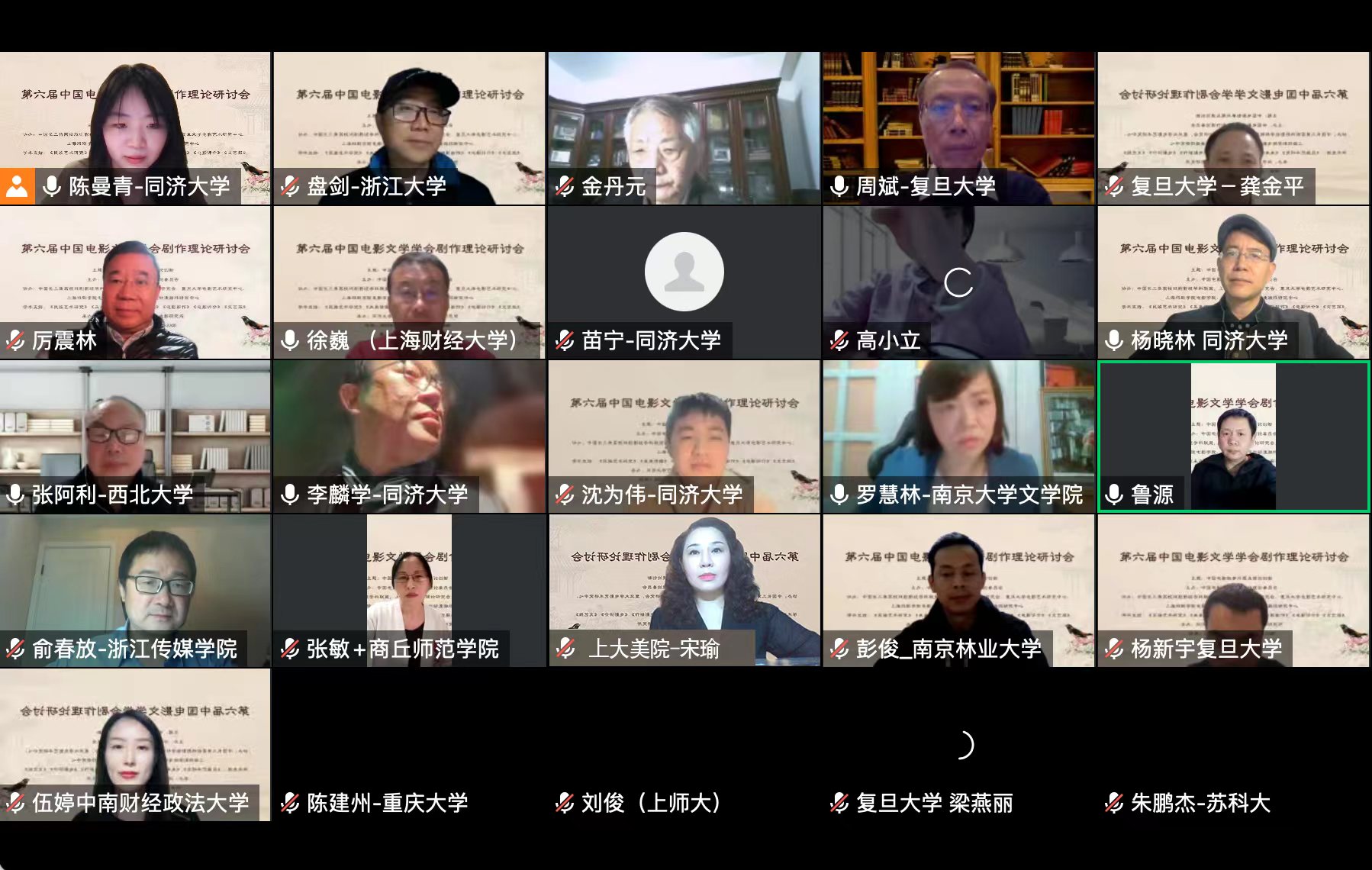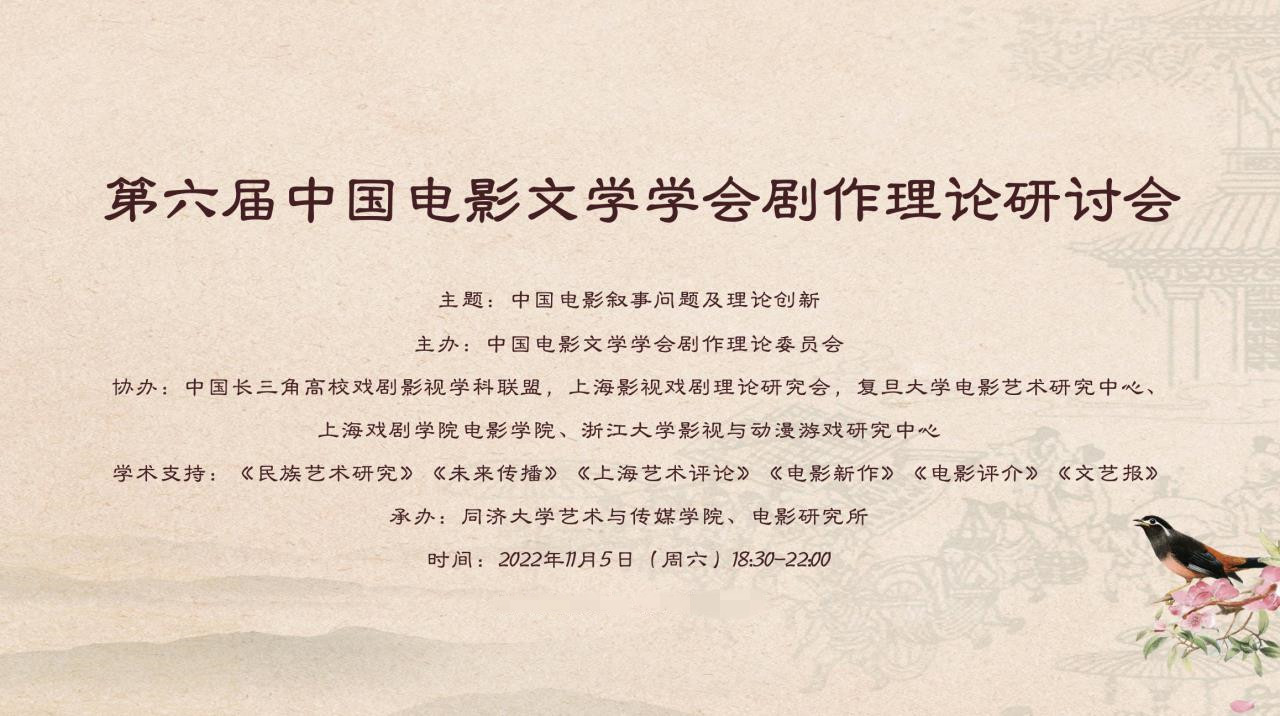
The 6th China Film Literature Society's Symposium on Playwriting Theory was successfully held in the form of an online conference on November 5, 2022.

The seminar is held in the form of an online meeting
With the theme of "Chinese Film Narrative Issues and Theoretical Innovation", this seminar strives to pay attention to and promote the theoretical research and innovation of film narratology from an academic point of view, and promote the improvement of the artistic quality and influence of domestic films.
At the opening ceremony, Li Linxue, Dean of the School of Arts and Media, Tongji University, said that the forum was held in the context of building a Chinese-style modernization proposed at the 20th National Congress of the Communist Party of China, and it has a positive impact on the prosperity and development of film and television script creation. effect.

seminar poster
Zhou Bin, director of the Playwriting Theory Committee of the China Film Literature Society and professor of the Chinese Department of Fudan University, expounded on how to strive to build a theoretical system of film narratology with Chinese characteristics and how to strengthen the commentary and guidance on the narrative content and narrative form of domestic film creation. The theme of this conference, and I hope that through this seminar, scholars will be further stimulated to study and pay attention to the theory of film narratology, and continue to promote theoretical innovation, so as to build a theoretical system of film narratology with Chinese characteristics and improve the artistic quality of domestic films. make a contribution.
Zhang Ali, Chairman of Shaanxi Film Association, Dean of Northwestern University Film School, screenwriter, professor and doctoral supervisor, said in his keynote speech "The Mainstream Features of Chinese Film Narratives in the New Era and Ten Years" that the new era and ten years of new mainstream films have inherited The mainstream value of the main theme film draws on the experience of foreign Hollywood, Hong Kong and Taiwan and other films in terms of the structure of the film story, visual packaging, and audio-visual spectacle. It integrates the individual value of the hero and the social value, and builds a new look The mainstream value of the film; the realist film is deeply rooted in the reality of society, sticks to the people's standpoint, writes the spiritual epic of the Chinese people in the new era, and forms a diversified and typed localization practice in terms of story techniques and film characterization; film personality Great progress has also been made in the exploration of the subjectivity of the film and the exploration of nationality; the report of the 20th National Congress of the Communist Party of China proposed that Chinese-style modernization is the modernization of the harmonious development of man and nature, and Chinese films should adhere to and explore this aesthetic narrative expression.
Li Zhenlin, dean, screenwriter, professor and doctoral supervisor of the Film Academy of Shanghai Theater Academy, and vice president of the Chinese Film Literature Society, gave a speech on "Imagination is Eternal Competitiveness". He believed that imagination is eternal competitiveness. The pattern, technology pattern, and industry pattern put forward four requirements for the screenwriter's imagination: one is to surpass the imagination of the audience; the second is to have the imagination of technology; the third is to have the imagination of reality; four Is to have the imagination of extension products.
In addition, Tan Zhongchi, vice president and screenwriter of China Film Literature Society, Jin Danyuan, professor of Shanghai Film Academy, Pan Jian, professor of Zhejiang University School of Letters, Fan Zhizhong, vice president of Zhejiang University School of Media and International Culture, Yang Xiaolin, director of Tongji University Film Research Institute and other experts and scholars , respectively, "The New Era Film Narrative Should Highlight the Typicality of Character Building", "New Changes in the Cultural Orientation of Chinese Film Narratives in Recent Years", "On the Third Mode of Film and Television Creation: Rewriting", "Digital Age Movie Game Adaptation" "The Narrative Mechanism of Chinese Animation" and "The Theory Construction of Chinese Animation Narratology" and other topics.
Afterwards, the conference entered a sub-forum discussion session. More than 70 participants from more than 40 universities and film and television cultural institutions made speeches successively. Everyone discussed domestic film narrative cases, cross-text and cross-cultural narrative, new narrative phenomena and new issues, and Chinese films. Topics such as narrative tradition, animation and micro-film narrative were discussed and exchanged.